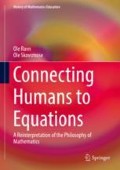Abstract
This chapter investigates the logicist programme that became influential in the first part of the 20th century. Logicism pursues the idea of reducing mathematics to the secure foundation that has been established in logic. It suggests how mathematical concepts can be defined in terms of logical concepts, and how mathematical theorems can be derived from logical proposition.
The chapter considers Frege’s critique of important philosophic conceptions of mathematics, before it presents his elaboration of the logicist programme as provided in his Begriffsschrift. Then follows a presentation of Russell and Whitehead’s continued detailed elaboration in Principia Mathematica. This elaboration was initiated by Russell’s discovery of a paradox that apparently destroyed the solidity of the logical foundation of mathematics in the format suggested by Frege. Russell communicated his discovery of the paradox to Frege, who got deeply chocked. While Frege gave up solving the paradox and paralysed in his logical endeavours, Russell moved on and tried to locate a solution that could save the logicist programme. In his own time, Frege was an unknown German mathematician with a taste for logic. His work remained unknown to the wider public until Russell discovered and developed his ideas. Later, it became evident that Frege was the most important person in the development of modern logic.
Access this chapter
Tax calculation will be finalised at checkout
Purchases are for personal use only
Notes
- 1.
- 2.
See, for instance the remarks about Frege in Hersh (1998, p. 241).
- 3.
- 4.
In Frege’s (1978) own formulation: “If, in carrying out this process [of finding a proof to a proposition], we come only on general logical laws and on definitions, then the truth is an analytic one, bearing in mind that we must take account also of all propositions upon which the admissibility of any of the definitions depends. If, however, it is impossible to give the proof without making use of truths which are not of general logical nature, but belong to the sphere of some special science, then the proposition is a synthetic one. For a truth to be a posteriori, it must be impossible to construct a proof of if without including an appeal to facts, e.g., to truths which cannot be proved and are not general, since they contain assertions about particular objects. But if, on the contrary, its proof can be derived exclusively from general laws, which themselves neither need nor admit of proof, then the truth is a priori” (p. 4).
- 5.
- 6.
All this is nicely represented in the so-called truth tables, which however was not used by Frege.
- 7.
This was proved by Gödel in 1929.
- 8.
Frege’s distinction between sense and reference captures this idea, see Frege (1969).
- 9.
This idea Frege finds formulated in A Treatise of Human Nature by David Hume (2000).
- 10.
- 11.
As example one can consider the definitions of infimum and of supremum in calculus. Thus we define: the infimum of a subset S of a partially ordered set T is the greatest element of T that is less than or equal to all elements of S.
- 12.
An alternative axiomatisation of set theory is presented by Ernst Zermelo and Abraham Fraenkel. Their approach falls entirely outside the logicist programme by being much more heuristic. Their idea was that the axioms of the set theory must, on the one hand, ensure the existence of sufficient richness of sets that can satisfy what is needed in mathematics, but, on the other hand, the axioms must ensure that not too many sets become generated as this could bring about paradoxes.
References
Dummett, M. (1981a). Frege: Philosophy of language. London, UK: Duckworth.
Dummett, M. (1981b). The interpretation of Frege’s philosophy. London, UK: Duckworth.
Dummett, M. (1991). Frege: Philosophy of mathematics. London, UK: Duckworth.
Frege, G. (1893/1903). Grundgesetze der Arithmetik I-II. Jena, Germany: H. Poble.
Frege, G. (1967). Begriffsschrift: A formula language, modelled upon that of arithmetic, for pure thought. In J. van Hiejenoort (Ed.), From Frege to Gödel: A source book in mathematical logic, 1879–1931 (pp. 1–82). Cambridge, MA: Harvard University Press.
Frege, G. (1969). Über Sinn und Bedeutung. In G. Frege (Ed.), Funktion, Begriff, Bedeutung: Fünf logische Studien (pp. 40–65). Göttingen, Germany: Vandenhoech & Ruprecht.
Frege, G. (1978). Die Grundlagen der Arithmetik/the foundations of arithmetic. Oxford, UK: Blackwell.
Hersh, R. (1998). What is mathematics, really? London, UK: Vintage.
Hume, D. (2000). A treatise of human nature. Oxford, UK: Oxford University Press.
Ishiguro, H. (1972). Leibniz’s philosophy of logic and language. London, UK: Duckworth.
Kneale, W., & Kneale, M. (1962). The development of logic. Oxford, UK: Clarendon Press.
Leibniz, G. W. (1966). Logical papers: A selection. (Translated and edited with an introduction by G. H. R. Parkinson). Oxford, UK: Clarendon Press.
Monk, R. (1996). Bertrand Russell: The spirit of solitude. London, UK: Jonathan Cape.
Monk, R. (2000). Bertrand Russell: The ghost of madness. London, UK: Jonathan Cape.
Moorehead, C. (1992). Bertrand Russell: A life. London, UK: Sinclair-Stevenson.
Russell, B. (1978). Autobiography. London, UK: Unwin Paperbacks.
Russell, B. (1992). The principles of mathematics. London, UK: Routledge.
Russell, B. (1993). Introduction to mathematical philosophy. London, UK: Routledge.
Whitehead, A., & Russell, B. (1910–1913). Principia mathematica I-III. Cambridge, UK: Cambridge University Press.
Author information
Authors and Affiliations
Rights and permissions
Copyright information
© 2019 Springer Nature Switzerland AG
About this chapter
Cite this chapter
Ravn, O., Skovsmose, O. (2019). A Solid House of Cards. In: Connecting Humans to Equations . History of Mathematics Education. Springer, Cham. https://doi.org/10.1007/978-3-030-01337-0_4
Download citation
DOI: https://doi.org/10.1007/978-3-030-01337-0_4
Published:
Publisher Name: Springer, Cham
Print ISBN: 978-3-030-01336-3
Online ISBN: 978-3-030-01337-0
eBook Packages: EducationEducation (R0)

